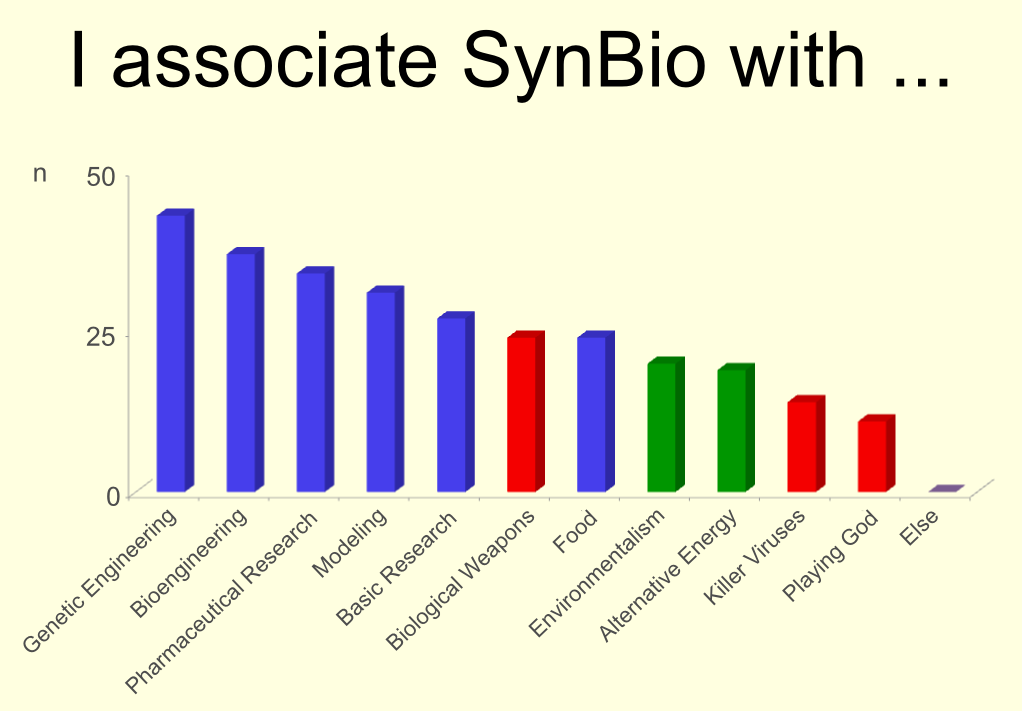Team:Heidelberg/HumanPractice/Survey
From 2013.igem.org


Survey. What Society thinks of Synthetic Biology.
The public opinion has great impact on the future of any new technology. Although researcher might be able to offer solutions for major issues society is currently facing, they depend on the approval and goodwill of the public, to realize their ideas. Moreover, national and international legal frameworks limit every scientific action, which again, lie in the hand of the people. Thus, communication with a broader cross section of society plays a key role for the success of a project. According to the Online Etymological Dictionary, communication (from Latin commūnicāre, meaning "to share") is the activity of conveying information through the exchange of thoughts, messages, or information, as by speech, visuals, signals, writing, or behavior. It is the meaningful exchange of information between two or more living creatures. To promote the dialogue with society, we organized a talk evening addressing the question "On the Way to a Synthetic Future?" in cooperation with the Biotechnological Students Initiative e.V.and the Helmholtz-Initiative for Synthetitic Biology, where we received more than 100 guests. Of course we were highly curious about our audience's opinion on synthetic biology and therefore asked our guests to give us feedback via a survey, in which 55 people took part.
According to our survey, our audience shows a nearly perfectly balanced gender distribution (51% feamle, 49% male). The average test person was 23.7 years old, whereas women were slightly older than men (24.2 years compared to 23.3 years old). Pleasingly, we were able to reach all ages: The youngest participants were 14 years old, the oldest a 72 years old gentleman. As one would expect, the distribution of degrees corresponded well with the average ages. The majority of our guests held a high school degree (60.0%, of these are 29.1% females, 30.9% are male). This is followed by secondary school certificate ("middle school") and the bachelor degree.
By first established a common language and common basic knowledge on synthetic biology, we aimed to enable everyone in the audience to fully understand the science and the conceptof synthetic biology. According to the Eurobarometer 2010, only 18% of the people have heard of synthetic biology. Germans are the most sceptical of all European countries: only 27% support synthetic biology, 20% of society strongly disagree and 31% disagree with exceptions. In the public perception, synthetic biology is mainly associated with biotechnology, human enhancement, cloning of human and green biotechnology.
According to the Eurobarometer 2010, only 18% of the people have heard of synthetic biology. Germans are the most sceptical of all European countries: only 27% support synthetic biology, 20% of society strongly disagree and 31% disagree with exceptions. In the public perception, synthetic biology is mainly associated with biotechnology, human enhancement, cloning of human and green biotechnology.
In summary, the field of synthetic biology was attributed to harbor great potential, yet, the fact that we are unable to foresee possible risks of this new technology was clearly pointed out. One of the major demands of our lecturer's and our audience was to promote the dialogue between science and society, by public talk evenings and panel discussions just like ours to allow direkt and personal communication. Another aspect was the more philosophical question on whether we actually want to realize everything that might be possible. This led to the important issue how to regulate research and who is in the position to do so. Of course, national and international legal frameworks limit every scientific action, which again, lie in the hand of the people. The presented data as well as our survey shows that the general public has a very heterogenous perception of synthetic biology. As expected, we also got a bit lost in defining what synthetic biology actually is. Whether is really is a new research field or rather a summarizing term for of many interacting disciplines.
 "
"













